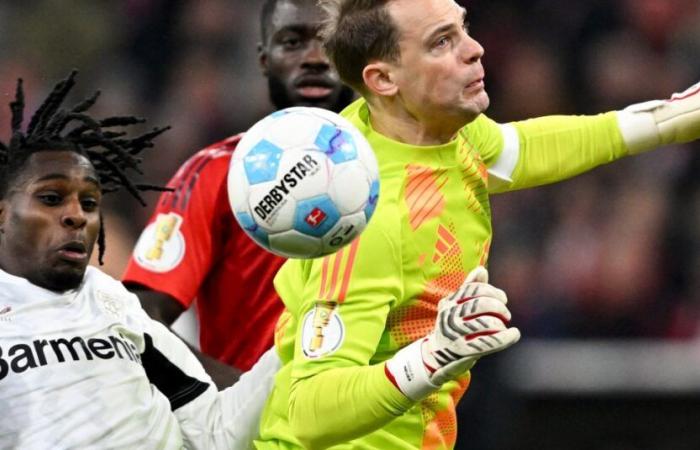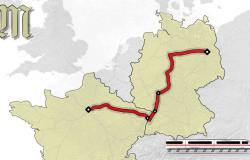Und weil die Falle zuschnappt, macht es an diesem Dienstagabend, an dem sich 75.000 Zuschauerinnen und Zuschauer in der Arena in München das Achtelfinalspiel des DFB-Pokals anschauen, in der 17. Spielminute dann nicht nur schnapp!, sondern auch richtig rumms!
Es geht gleich um die Falle, die dieses Fußballspiel entschieden hat. Um die Mannschaft, die sie gestellt hat. Um den Spieler, der in sie getappt ist. Und es geht gleich um die Fragen, die seit diesem 0:1 wieder diskutiert werden: Was bedeutet dieses Ergebnis für den FC Bayern München, für den erfolgreichsten deutschen Fußballklub, der damit das fünfte Mal in Serie frühzeitig aus dem DFB-Pokal ausgeschieden ist? Und was bedeutet es für Manuel Neuer, der es mit der ersten Roten Karte seiner Karriere eingeleitet hat?
Doch wer sich mit den Ereignissen dieser Episode auseinandersetzen will, muss sich davor mit dem Prolog auseinandersetzen.
Birmingham, 3. Oktober 2024. Es ist fast Mitternacht, als der spanische Trainer Unai Emery im Stadion von Aston Villa sitzt und erzählt, dass er in der Analyse mit seinem Trainerteam festgestellt habe, dass Manuel Neuer, der Torhüter, der gerade in der Gruppenphase der Champions League gegen seine Mannschaft gespielt hat, in dieser Saison sehr hoch stehe. Er erzählt das deswegen, weil sein Stürmer Jhon Durán den Ball dann, wie geplant, über den sehr hoch, also weit vor seinem Tor stehenden Neuer ins Netz geschossen und den 1:0-Sieg gegen den FC Bayern möglich gemacht hat. Schnapp!
„Eine Situation, die wir versucht haben zu kreieren“
Das ist der Prolog, der an diesem Dienstagabend im Dezember im Pokalspiel zwischen Bayern München und Bayer Leverkusen seine Fortsetzung findet.
Als die meisten der 75.000 Menschen das Stadion schon verlassen haben, steht Simon Rolfes, der Geschäftsführer Sport aus Leverkusen, in der Interviewzone der Arena. Er sagt dort, dass er das Spiel der Bayern gegen Aston Villa nicht gesehen habe, aber dass dafür sowieso die Scouts verantwortlich seien. Doch er hat zu dem Zeitpunkt schon verraten, dass die Schlüsselszene einem Plan folgte.
Externer Inhalt von Youtube
Um externe Inhalte anzuzeigen, ist Ihre widerrufliche Zustimmung nötig. Dabei können personenbezogene Daten von Drittplattformen (ggf. USA) verarbeitet werden. Weitere Informationen .
Externe Inhalte aktivieren
In the Sky interview he said: “I think the red card was a situation that we tried to create, at least to become a goal threat, of course not a red card, but to counter Bayern a little bit with balls like that, the spaces And then: “To create situations, to create dangerous situations and perhaps in this way to force Manuel to make such a decision.”
“Hurts us. And of course I’m sorry.”
You can see from several decisions earlier this evening that coach Xabi Alonso is setting this trap. Because he doesn’t field center forward Patrik Schick, who has scored six goals in the last four games, but rather the faster Florian Wirtz in his position. Because, as Jonathan Tah later confirmed, he tasked his defenders with passing the ball high and wide into Bayern’s half.
And the fact that he tells his fast winger Jeremie Frimpong early on that he should switch sides – probably because he has a speed advantage there against right-back Konrad Laimer.
This is how it works in the 17th minute of the game: Tah passes the ball high and far into Bayern’s half, Wirtz pulls the central defenders from Munich with him into midfield, Frimpong runs in – and Laimer runs away. And when the ball hits the ground again in front of Bayern’s penalty area, Neuer, who hesitates for a while, is too late. He rams Frimpong over. Red card. Snap!
When Neuer himself appears in the interview zone and the first reporter wants to know how he assesses the scene, he answers like this: “Yes, of course it’s crucial to the game. Hurts us. And of course I’m sorry.” But that leads to the next question: Is Neuer that prone to errors, or does the system make him look so prone to errors?
This season you can notice almost week after week that Neuer, as they say in top-class sport, has not only lost a step, but with this step he has also lost his feel for storming out of the goal. But you can also say that Bayern’s system, the high level of defense that the new coach Vincent Kompany orders, always puts him in difficult situations. But even then, this game is likely to influence the answer to the next question: whether the club should extend Neuer’s contract, which ends next summer, again.
“Great, great respect for this team”
After Neuer, the midfielder Joshua Kimmich, the sports director Max Eberl and the all-rounder Thomas Müller, who was not allowed to play that evening but still wants to speak, will be in the interview zone. And their analyzes are almost enthusiastic about the fact that FC Bayern, the German football club that defines itself more than any other by winning, was eliminated from its stadium in the round of 16 of the DFB Cup.
“I don’t think we could have been much better or more dominant with eleven,” says Kimmich.
“We played a good game and were eliminated,” says Müller.
“I have great, great respect for this team,” says Eberl.
It was actually amazing how Bayern were able to control the game even with one less player. And it was even more astonishing that they managed to do this against the German football team, who can actually exploit such outnumbered situations perfectly thanks to their positional play.
And yet it seems that Max Eberl wants people to notice his anger at least in one place.
“Did you just leave that out?”
In the interview zone, it’s not just about Neuer that’s being discussed, but also about the fact that Bayern won against Paris, but otherwise – if you exclude the shaky Stuttgart team – they couldn’t win against any other opponent in this weight class: not against Aston Villa (0 :1), not against Frankfurt (3:3), not against Barcelona (1:4), not against Dortmund (1:1) and now twice not against Leverkusen (1:1 and 0:1).
When the “Kicker” reporter Georg Holzner repeatedly mentions this, Eberl replies: “Mr Holzner, I know, I know that you are very critical, I know that you question everything – I don’t really give a shit about that.” That is It’s worth mentioning because it’s the second time that Eberl responds very snapped in this setting.
And therefore completely different from Thomas Müller, the master of the interview zone. When a reporter asks him about the lack of victories, but omits the win against Paris, Müller replies: “Did you also mention Paris, or did you just leave that out?” And further: “If only I [Spiele] If you look at the ones we won, then we all won. If I just look at the ones we didn’t win, then it’s clear.” Shortly afterwards he disappears too.
What remains? That you can and can lose a game like that against an opponent like that. But also that the decisive scene of this game was once again a reminder that FC Bayern can be lured further into a trap.






